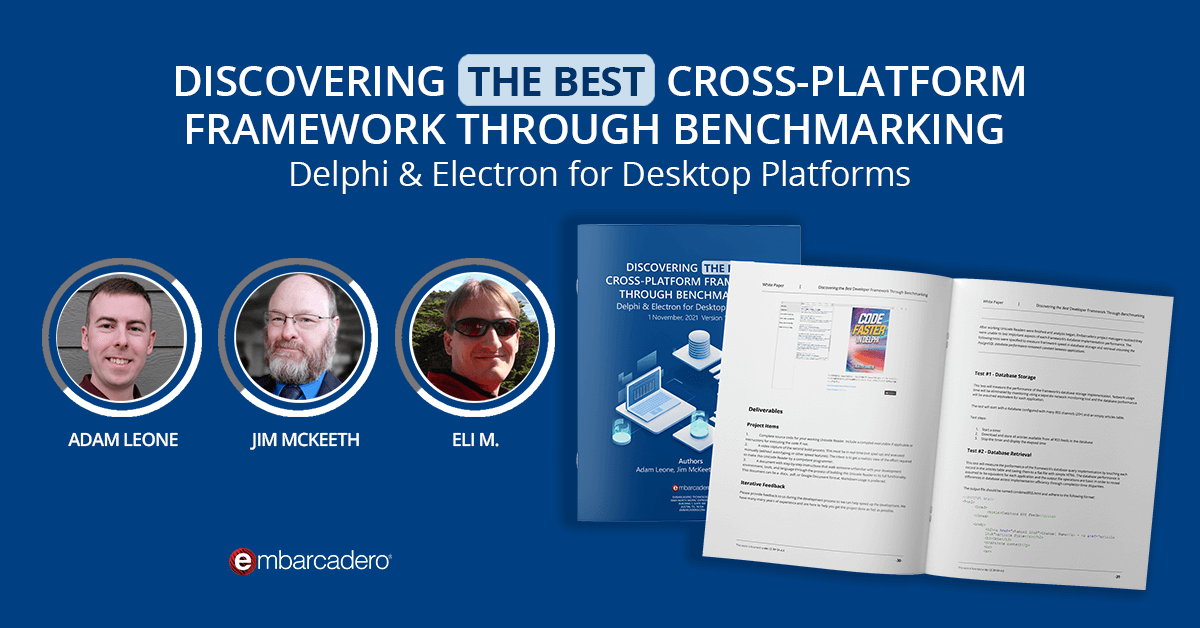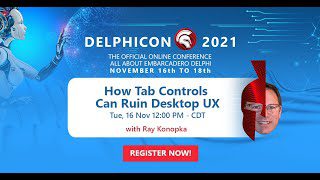
Table of Contents
My first Pascal, Turbo Pascal and Delphi Experiences
I wrote my first Pascal program in 1972 as a Computer Science student at Cal Poly San Luis Obispo. I knew from the beginning that Pascal would be part of my future career in some way. I first met Philippe Kahn at the Comdex Las Vegas 1983 convention when he stopped our Softsel Computer Products (now Merisel) booth. Back then I was running the evaluation, support and training department for this leading software distributor.
After talking for awhile about programming, Phillippe gave me Turbo Pascal v1 CPM/80 8 inch and PCDos 5.25 inch floppy disks. I put the PCDos version into my PC and wrote a small program, compiled and ran it. I knew right then that this was a very special developer tool. Then in June of 1985 I had the honor to join Borland in Scotts Valley where I spent 31 years focused on developer tools and developer relations.
I was so lucky to be able to participate in the growth of programming and the evolution of what is now Delphi. When I try to describe Delphi to other programmers, they don’t believe that you can use one language, compiler, tools, IDE, components, libraries and frameworks to build cutting edge desktop, mobile, server, cloud, service and many other types of applications.
At the Delphi v1 launch in San Francisco during the Software Development Conference, our Borland booth was loaded with excited developers (as the picture at the top of this post shows). On that Valentine’s Day evening, the team introduced Delphi to a packed ballroom. You can view the “Historical Documents” used that night to experience what took place (except for the joy, cheers and thrills). You can also download the original Delphi 1 launch script and project files.
Delphi Today
Even though I am a semi-retired software engineer and full time developer cheerleader, I continue to read and write code every day using Delphi and C++Builder. I still can’t believe that it’s been 50 years since I wrote my first Pascal program. It’s a privilege to be part of the thriving Delphi developer community. I am always amazed to see what Delphi developers are building and how they are pushing the envelop in software development. What is Delphi? It’s the original Pascal language + modern language extensions + objects + components + interfaces + libraries + frameworks + compilers for multiple platforms + an extensible IDE + a tools and components ecosystem, a global developer community and a whole lot more.
How can Delphi continue to build the future and continue to help make the world a better place? A few simple observations: leverage all of the tools that Embarcadero and Idera provide, keep suggesting new features for Delphi (and provide use cases for each one), report all bugs in Quality Central, write some program code every day, try to build new types of applications, explore new components, check out new APIs and learn from what is happening with other programming languages, IDEs, and platforms. Here’s a challenge: think about building applications that bring people together instead of keeping them apart.
Worst and Best Delphi Programs I Ever Created
Worst on the fly Delphi demo I ever wrote was a thread based sort program I created on the plane to the Microsoft Windows 95 launch which took place on the Microsoft campus. As I was flying to Seattle, I realized that I didn’t have a Delphi 2 demo that took advantage of Win95 32-bit OS and other features. So, for the duration of flight I hacked together the 32-bit VCL application.
The best Delphi program I ever created is one that I haven’t written yet.
Delphi Version that Never Shipped
Delphi for Java. Demoed by Chuck Jazdzewski, Delphi Chief Architect, at BorCon (Inprise) Denver in August 1998. During the technology keynote that showcased developing enterprise applications, Chuck came running up to the stage to demonstrate a Delphi for Java bytecode compiler that enabled the creation of server side Delphi programs that ran on Java virtual machines.
Delphi Version I Can’t Wait to Get my Hands On
The version of Delphi that I really want to see appear in the next year is Delphi for ARM targeting Raspberry PI and Linux. Alan Bauer demonstrated a Delphi compiler generating ARM code that ran on a Raspberry PI in 2012. Delphi already has compilers for ARM chips and proven components and runtime library for iOS, Android and macOS. Delphi also supports Intel based Linux 64 bit platforms. Of course, compilers, frameworks and runtime libraries take time to port and be tested. I will definitely sign up to be an early beta tester if (or when) I get the invitation.
Looking Ahead to Delphi’s 36th Birthday on February 14, 2031 🙂
When I participate in Delphi’s 36th birthday celebration I will be almost 80 years young. I will marvel at all of the Delphi innovations that are shaping the world of software development. I hope to see a few of the following accomplishments that have taken place since Delphi’s 27th birthday.
Kids have started to build Delphi applications in pre-school software development camps and classrooms. They start making so much money, that their school and college costs are paid for and they start their own software companies before they are 16 years old.
The Delphi language is now multi-paradigm supporting imperative, structured, procedural, object-oriented, script, functional, declarative, constraint, logic, script, event-driven, flow-driven, array and aspect-oriented features. Delphi includes language extensions that support for high performance computing via GPU, FGPA, ASIC, CPLD and Quantum.
Delphi’s data type extensions coupled with FireDAC’s components allow high speed connection and processing of the World’s Open Data Bank (the one global datastore to rule them all). FireDAC also provides components that allow developers to add data-centric AI to their applications. Take a look at Andrew Ng’s “MLOps: From Model-centric to Data-centric AI” slide deck.
Developing a solution no longer requires projects, project groups, source files, forms and the other digital artifacts of past development. All members of the team simultaneously work on the various functions and fixtures housed in a global development warehouse.
Team integration and communication is provided for everyone involved in the company’s business. Designing, prototyping, coding (traditional, low, no and automatic), immediate refactoring, system integration, continuous builds, automated testing, intelligent debugging, complete documentation, and target deployment now take place in real time as changes are made and features are added.
The Delphi 128-bit IDE can be used from desktops, smartphones, voice, and on other devices (even in your autonomous vehicle). The IDE provides enhanced OTAPI support with pre-built language plug-ins for Python, R, Rust, Go, and other “popular” and emerging programming languages and paradigms. The IDE also supports sandboxing so that components and plug-ins can’t bring down the IDE, a Smart SDK and Connection manager that automatically adds support for new platforms and devices that are found, and an intelligent patch manager for Delphi and your apps.
Developers can now choose to build solutions leveraging a wide range of application types and technologies including: Desktop, Mobile, Browser, Platform, Database, Cloud, Service, Embedded, Wearable, Implantable, Zero Trust Secure, Autonomous, Computational Empathy, Creative Arts, Metaverse, Artificial General Intelligence and Human Augmentation.
Developers use the Delphi IDE’s multi-lingual Hyper-Wiki to find source code, information, algorithms, components, tips, tutorials, skills, answers, wizards, updates, data sources, service interfaces, videos, and more. A global payment system is provided so that digital asset owners are compensated when developers move from prototype to development and on to deployment.
Where the Future is Headed
Whenever I’m not sure about the future or how software development will impact our world, I often think back to Christopher Alexander’s keynote at ACM OOPSLA 1996 conference in San Jose California. At the end of the keynote, he concluded his talk with the following thoughts:
I heard a rumor at breakfast that some of the people in this room have begun to worry about their jobs. I have no idea if that is true. But I was told there is an undercurrent of unease as to where all this—software design—is going. There is a huge expanding phenomenon of programming as an art, and yet an uneasiness about where it is all headed? What is it going to do?
My comment on this? Please forgive me, I’m going to be very direct and blunt for a horrible second. It could be thought that the technical way in which you currently look at programming is almost as if you were willing to be “guns for hire.” In other words, you are the technicians. You know how to make the programs work. “Tell us what to do daddy, and we’ll do it.” That is the worm in the apple.
What I am proposing here is something a little bit different from that. It is a view of programming as the natural genetic infrastructure of a living world which you/we are capable of creating, managing, making available, and which could then have the result that a living structure in our towns, houses, work places, cities, becomes an attainable thing. That would be remarkable. It would turn the world around, and make living structure the norm once again, throughout society, and make the world worth living in again.
This is an extraordinary vision of the future, in which computers play a fundamental role in making the world—and above all the built structure of the world—alive, humane, ecologically profound, and with a deep living structure. I realize that you may be surprised by my conclusion. This is not what I am, technically, supposed to have been talking about to you. Or you may say, Well, great idea, but we’re not interested. I hope that is not your reaction. I hope that all of you, as members of a great profession of the future, will decide to help me, and to help yourselves, by taking part in this enormous world-wide effort. I do think you are capable of it. And I do not think any other professional body has quite the ability, or the natural opportunity for influence, to do this job as it must be done.
Happy 27th Birthday Delphi !!!
Using Delphi saves time. Time is precious. Life-long learning is a happy journey. Make sure you enjoy your time with Delphi, your family, and your friends.
David I
February 14, 2022
Ashland, Oregon USA

Design. Code. Compile. Deploy.
Start Free Trial Upgrade Today
Free Delphi Community Edition Free C++Builder Community Edition






Yes, I’ve been with Pascal since 1984 (thanks Orwell) and the fascination hasn’t waned. Programming is a brutal art and I know people lie but numbers don’t.
Pascal in 1984 was doubleplusgood
So, good++ ? 😜
Pascal was a great idea right from the start. Right now, the language, especially as it has evolved to embrace new thinking in Computer Science as well as add so many useful things in the guise of Object Pascal and multi-platform flexibility, is still absolutely double plus good. 👍
I missed this event! I subscribed using the one-click option and never got the mail to access the event.
This happens every time I use the one-click option. Does anybody know of a better way to subscribe for future events?
Hi Ian! does the statement “The IDE provides enhanced OTAPI support with pre-built language plug-ins for Python, R, Rust, Go, and other “popular” and emerging programming languages and paradigms.” Mean that I can use Rust with inside of rad studio? If yes how can this be done?